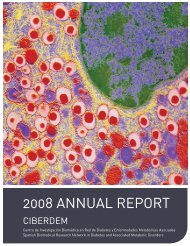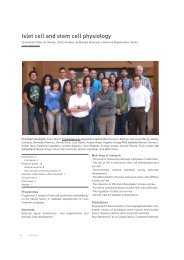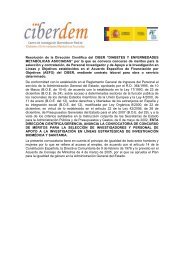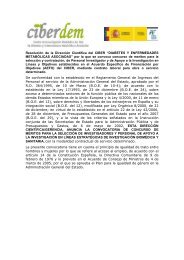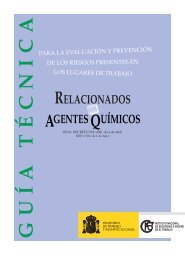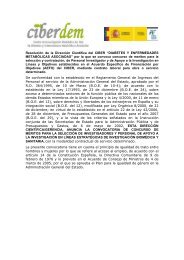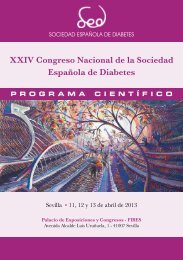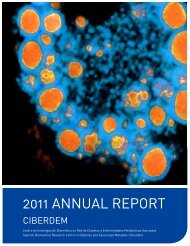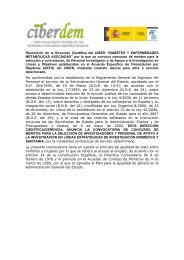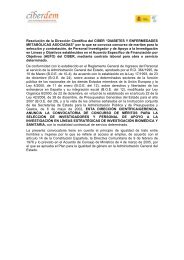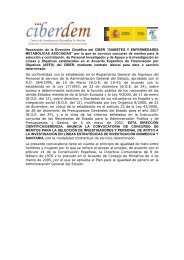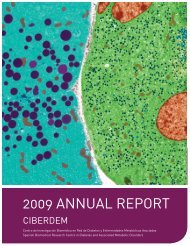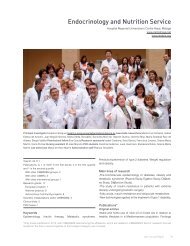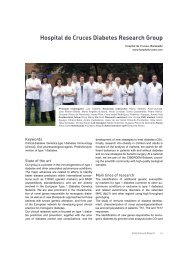2010 AnnuAl REpoRT - Ciberdem
2010 AnnuAl REpoRT - Ciberdem
2010 AnnuAl REpoRT - Ciberdem
You also want an ePaper? Increase the reach of your titles
YUMPU automatically turns print PDFs into web optimized ePapers that Google loves.
Project management<br />
Introduction<br />
The Spanish Biomedical Research Centre in Diabetes<br />
and Associated Metabolic Disorders (CIBERDEM)<br />
works hard to obtain additional competitive funding to<br />
develop research into diabetes and associated metabolic<br />
disorders.<br />
Currently, CIBERDEM’s project management department is<br />
involved in all project phases, giving support to CIBERDEM<br />
researchers in the preparation and presentation of<br />
proposals, and also the submission, implementation and<br />
justification of funded projects.<br />
CIBERDEM aims to expand its presence in the worldwide<br />
scientific community in its specific research field. The<br />
strengthening of national, international and intersectorial<br />
collaboration in research will help us to obtain more and<br />
better scientific outcomes with high translational impact.<br />
Objectives<br />
To achieve excellence, to obtain competitive funding and to<br />
monitor projects from implementation to justification.<br />
To give support in the preparation of proposals by<br />
researchers in the consortium.<br />
To internationalize Spanish biomedical research, in<br />
particular as regards CIBERDEM’s main lines of research<br />
into diabetes and associated metabolic disorders.<br />
To encourage and motivate researchers to participate in<br />
calls and seize opportunities to take part in different kinds<br />
of programmes through the monthly internal newsletter.<br />
Coordination<br />
Gemma Pascual, CIBERDEM Project Manager, and Donald<br />
Mc Donagh, CIBERDEM Proposal Writer.<br />
Achievements in <strong>2010</strong><br />
CIBERDEM’s own actions<br />
These are transversal initiatives implemented by members<br />
of the consortium and in some cases with the collaboration<br />
of external personnel. These translational projects try to<br />
answer complex questions which could not be resolved<br />
by one group working alone and will prove of benefit to<br />
diabetic patients and the healthcare system in general.<br />
In <strong>2010</strong>, 15 research actions were underway, although<br />
they had been implemented in previous years. These<br />
were: 1) the Di@bet.es Study, which is the first national<br />
epidemiological study that will provide the Spanish health<br />
authorities with real figures relating to the prevalence of<br />
type 2 diabetes (diagnosed as such or not) in addition to<br />
other relevant parameters; for more information see page<br />
21. 2) 14 CIBERDEM projects defined as translational<br />
initiatives resulting from internal collaborative work:<br />
-IREVAS, NEURONET-DIAB, INGENFRED, MODIAB, DOTUM,<br />
DIASOBS, GIDIPRED, CHILDBODYFAT, ANTIBECELL,<br />
LOWHDL, METADIAB, ENDODIAB, IODURE and STEMOB;<br />
for more information see page 23.<br />
CIBERDEM transversal initiatives are<br />
possible because of the synergistic work<br />
of nearly all the centre’s research teams,<br />
with both basic and clinical profiles<br />
National and Autonomous Community grants obtained<br />
During <strong>2010</strong>, two proposals submitted under the Strategic<br />
Health Action Call of the National Scientific Research,<br />
Development and Technological Innovation Plan of the<br />
Spanish Ministry of Science and Innovation received<br />
grants. One was directed by Dr Mercedes Miranda<br />
(Phosphatidate phosphatases (PAP, Lipin) regulation of<br />
cellular functions by controlling phospholipid biosynthesis<br />
and its relation with obesity) and the other by Dr Josep<br />
Julve (HDL functionality in diabetes mellitus and<br />
hyperhomocysteinaemia: studies in patients and animal<br />
models); both are members of CIBERDEM’s postdoctoral<br />
staff. Dr Mercedes Miranda, whose centre is located in<br />
Tarragona, was also awarded an Autonomous Community<br />
mobility grant by AGAUR.<br />
International grants obtained<br />
Turning to international grants, in <strong>2010</strong>, an institutional<br />
proposal was submitted to the Marie Curie-COFUND<br />
Call in the People Programme as part of the European<br />
Commission’s 7th Framework Programme (FP7). This<br />
proposal, DIATRAIN (DIAbetes Trans-national Research<br />
Advancement for INvestigators), involved two post-doctoral<br />
mobility schemes and was led by Dr Ramon Gomis. The<br />
centre was invited to negotiate; in 2011 this process should<br />
be concluded and it is expected that implementation of the<br />
project will begin.<br />
CIBERDEM also submitted two initiatives as coordinator<br />
and two initiatives as a partner in response to the<br />
FP7 Health Call under the Cooperation Programme<br />
of the European Commission. Of these, one, entitled<br />
“Genetic and environmental factors of insulin resistance<br />
syndrome and its long-term complications in immigrant<br />
Mediterranean populations - MEDIGENE”, is currently<br />
under negotiation and is expected to be approved before<br />
the year is out.<br />
<strong>2010</strong> Annual Report<br />
9



